Chapter 5 5. Citizens and subjects
The "little man" in the eyes of Confucius is called "citizen" in the West.
This is like the "country people" in the Zhou Dynasty, which refers to "people in the capital".
However, in ancient Greece, not everyone living in a city-state was called a citizen.Slaves were not, and neither were Gentiles.Moreover, even if they are both citizens, their rights are different.Those with the most complete rights are limited to adult men among citizens, called "full-right citizens".They are the true masters of the city-state and the authorized persons of the city-state regime.Full citizens plus women and children are called "free citizens".Foreign immigrants and freed slaves are called "protected people".Protected people, women and children do not have the right to participate in, discuss and govern politics.
Obviously, this is a democracy that only a few can enjoy.
Limiting the number of people is inevitable.Because every citizen has rights and duties.This is the most important characteristic of citizenship.And having rights is more important than fulfilling obligations.If you have rights, you have everything; if you don't have rights, you can't talk about anything.What's more, once you have the right, you can exercise it or give it up, which is very free.
Would the city-state be willing to easily grant such qualifications and treatment?
The first condition for becoming a citizen of Greece is personal freedom, and it was the same for Rome later.In fact, citizens' public property is not public property, but public property.The property of Greek citizens and Roman citizens is all owned by individuals, and it is completely private ownership.
And only if it is private can it be public.Because you have your own private property, you don't have to be subordinate or attached to any group, organization, institution or individual, of course you are free.
Citizens are "free people".
The subjects were quite different.

Oracle's "Chen" (A 2851).This word is generally understood by scholars as prisoners of war and slaves. For example, Zheng Xuan called "the minister is the prisoner", Kong Yingda said "the minister is the captive who was captured by the conquest", and "Zuo Zhuan Eighteen Years of Duke Xi" called "the man is the minister". , women are concubines", Guo Moruo, Ye Yusen, Yang Shuda, Ma Xulun and others all hold this view, but explain it differently.
The small chief among these slaves may have been the patriarch or chief of the defeated tribe.They are the earliest "officials".The ministers of the monarch and ministers evolved from here.To put it bluntly, in fact, the nobles and officials regarded themselves as slaves in front of the monarch, just like the Manchu princes in the Qing Dynasty called themselves "slaves" when they met the emperor.
Similarly, min is not a good word, at least not a respectful title.
In ancient books, the word Min is often interpreted as dark, dark, blind, and gangster.Probably because the earliest people were prisoners of war and slaves, and some were blinded.For example, the people of Li are the Jiuli people who were defeated in the war; the people of livestock are the old slaves ruled by merchants;Since the defeat, it is naturally "the people".Man is the victor and the ruler.In ancient times, people were not equal.The highest level is "adults", followed by "little people", and the lowest level is "manmin".
Later, the slaves became commoners and were still the ruled.The so-called ant people, grassroots people, small people, untouchable people, untouchable people, fart people, including obedient people and good people, all obviously have the meaning of contempt and discrimination.In short, before the Qin and Han Dynasties, people were more valuable than the people; after the Qin and Han Dynasties, officials were more expensive than the people.Mencius was able to say "the people are the most precious", which is quite remarkable!

"Min" (Ke Ding) in bronze inscriptions.Some scholars interpret this word as "a general term for slaves who blind their left eyes", and some scholars interpret it as "the original character of sprouting, like seeds emerging from the ground, and it is extended to mean that all vegetation sprouts are called people".For both theories, please refer to Shang Chengzuo's "A Brief Introduction to the Silk Book of Chu in the Warring States Period".
A subject is a "subject".
Citizens are free and equal, and subjects are obedient and dependent.Therefore, the country of the subjects must be a monarchy, and the citizens prefer a democratic republic.The national model and political system are actually created and chosen by people themselves.
The relationship between the country and people may be here.
Notes:

Oracle's "Chen" (A 2851).This word is generally understood by scholars as prisoners of war and slaves. For example, Zheng Xuan called "the minister is the prisoner", Kong Yingda said "the minister is the captive who was captured by the conquest", and "Zuo Zhuan Eighteen Years of Duke Xi" called "the man is the minister". , women are concubines", Guo Moruo, Ye Yusen, Yang Shuda, Ma Xulun and others all hold this view, but explain it differently.

"Min" (Ke Ding) in bronze inscriptions.Some scholars interpret this word as "a general term for slaves who blind their left eyes", and some scholars interpret it as "the original character of sprouting, like seeds emerging from the ground, and it is extended to mean that all vegetation sprouts are called people".For both theories, please refer to Shang Chengzuo's "A Brief Introduction to the Silk Book of Chu in the Warring States Period".
Notes:
